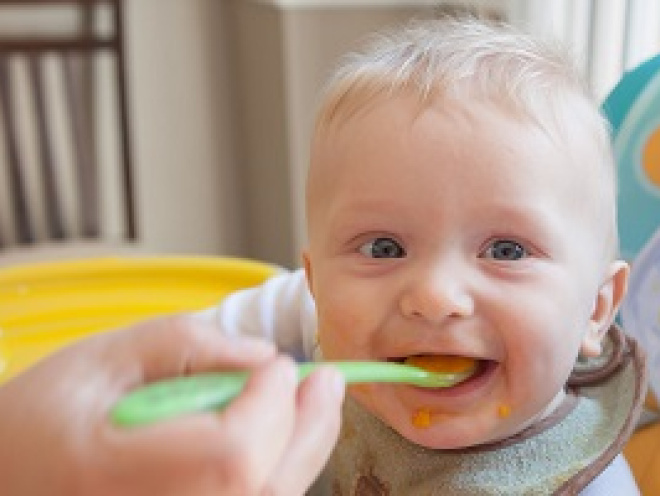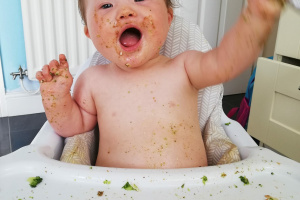Moving your baby on from milk doesn’t have to mean spending half your budget on veg. Here’s how to move your baby on to food cheaply but healthily…
When it comes to introducing solid foods to babies, there’s always going to be waste.
There’s that avocado your baby threw at the fridge and the mashed potato on the bottom of your slipper. There’s also the butternut squash they point blank refused to eat despite devouring the same thing the day before.
There’s also the pressure to feed your baby the best quality produce, and a slew of pre-prepared products on the market. So no wonder it can all seem like it’s going to be pretty pricey.
Yet – genuinely – it doesn’t need to be. We’ve put together our own tips plus some parents’ tips to help you to get your child onto solid food without clearing out your bank account.
1. Go for homemade baby food (as often as possible)
Homemade food can be made from simple ingredients, although obviously don’t add sugar or salt. You can keep any unused food in the fridge for 24 hours or frozen for three months.
Homemade food is quick and easy and a lot cheaper than shop-bought baby food (NHS, 2019).
“I have quite strong feelings on plastic tubes of baby food. Apart from the environmental perspective, the food in them isn’t fresh and the taste won’t be right, plus they are much more expensive. I just mash up an avocado or banana.” Julie, mum to Molly.
2. Introduce food at the right time of day
If you try to feed solids to your baby when they’re tired, they’re more likely to be disinterested or fussy (NHS, no date). So feed your baby when they’re not too tired or hungry and you have lots of time to sit down for a meal. They’ll be more likely to try things and come to different foods gradually. And you’ll get less waste.
3. Batch-cook and freeze
Batch cooking and freezing on weekends makes sure your baby gets good quality food and it could be cheaper for you too. Here’s what one dad suggests:
“Batch-cook and pop it into small plastic pots, or use ice cube trays at the beginning if you do purees. Sweet potato, carrot, parsnips, swede, broccoli, cauliflower are great introductory tastes. And you’ll get so many meals out of them if you do it this way, with minimal waste.” Robert, dad to Nikki.
4. Avoid ‘baby specific’ foods
You’ll probably have seen a whole host of baby rice, baby porridge, baby pasta, baby rice cakes etc. on the market. Yet there’s no reason why your baby can’t eat normal (cheaper) versions (First Steps Nutrition Trust, 2020).
5. Make a meal plan
It might surprise you to know that as much as half of all food grown is lost or wasted before and after it reaches home (Harvey et al, 2022). At least you can do your part to reduce food waste after buying your food.
It might sound dull, and like something your parents used to do that made you want to roll your eyes. But meal plans do mean you buy what you need and don’t end up chucking out a load of fresh goodies each week.
6. Bake with leftovers
When you do have fruit or veg left over that’s about to go off, sling it into some muffins or an omlette with a few herbs. And voila: a free extra meal, pretty much.
7. Use frozen fruit and veg
Add frozen fruit to yoghurts instead of buying flavoured and sweetened ones, or add handfuls of frozen spinach to pasta sauces. Frozen fruit and veg retains its nutrients and it’s so much cheaper (Ellis, 2020).
8. Slow cook cheap meat
Meat is often one of the most expensive foods you can give to a child – which might make you want to weep when it ends up on the floor. But slow cookers and stews could solve the problem.
You could buy cheap cuts that cook well for a long time so they’ll be super-soft, which is great for early eating (The Diary of a Frugal Family, 2015). You could have a quick Google for recipe ideas.
9. Keep breastfeeding if you can
You can carry on breastfeeding as long as you want but recommendations are that you do so exclusively for the first six months and up to two years of age or beyond (World Health Organization, no date). Here’s what one mum said about it:
“Keep breastfeeding for as long as possible, then you save on milk at least.” Sarah, mum to Caroline.
10. Try baby-led weaning
Baby-led weaning might be easier and cheaper because it involves feeding your baby family foods, rather than preparing separate meals. Here’s one dad’s experience:
“Baby-led weaning (i.e. letting your child pick up their own finger foods and not pureeing) saves you so much money because you’re not having to buy and make separate meals. This way, they eat what you eat. Obviously, it needs to be low salt and healthy but that’s not a bad habit for you either. You can always add salt to yours later.” Graham, dad to George.
This page was last reviewed in February 2022.
Further information
Our support line offers practical and emotional support in many areas of pregnancy, birth and early parenthood: 0300 330 0700.
You might find attending one of our Early Days groups helpful as they give you the opportunity to explore different approaches to important parenting issues with a qualified group leader and other new parents in your area.
Make friends with other parents-to-be and new parents in your local area for support and friendship by seeing what NCT activities are happening nearby.
You might find attending one of NCT's Introducing Solids Foods workshops helpful as they cover topics such as when to start weaning, purees and baby-led weaning, as well as what foods to avoid. They are all run by one of our qualified practitioners.
Ellis E. (2020) Frozen foods, convenient and nutritious. Academy of Nutrition and Dietetics. Available at: https://www.eatright.org/food/planning-and-prep/smart-shopping/frozen-f… [Accessed 11th February 2022]
First Steps Nutrition Trust. (2020) Eating well: The first year – A guide to introducing solids and eating well up to baby’s first birthday. Available at: https://www.firststepsnutrition.org/eating-well-infants-new-mums [Accessed 11th February 2022]
Harvey J, Nica-Avram G, Smith M, Hibbert S, Muthuri J. (2022) Mapping the landscape of consumer food waste. Appetite. 168(1):105702. Available at: https://www.researchgate.net/publication/354727887_Mapping_the_landscap…; [Accessed 11th February 2022]
NHS. (2019) Help your baby enjoy new foods. Available at: https://www.nhs.uk/conditions/baby/weaning-and-feeding/help-your-baby-e… [Accessed 11th February 2022]
NHS. (no date) Getting ready. Available at: https://www.nhs.uk/start4life/weaning/getting-ready/ [Accessed 11th February 2022]
The Diary of a Frugal Family. (2015) Is a slow cooker really cheaper than your oven. Available at: https://www.frugalfamily.co.uk/is-a-slow-cooker-really-cheaper-than-you… [Accessed 11th February 2022]








